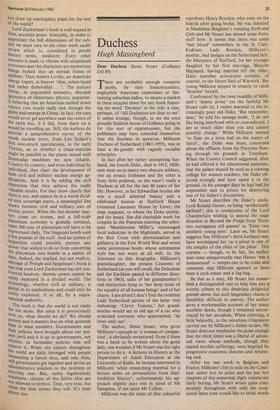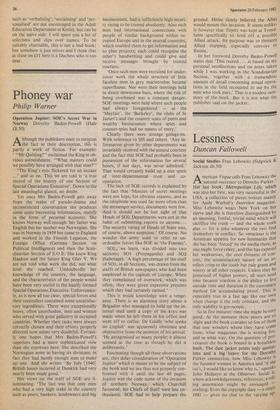Duchess
Hugh Massingberd
There are probably enough romantic snobs, be they homosexualists, anglophile American expatriates or fan- tasising suburban ladies, to ensure a market in these escapist times for any book featur- ing the word 'Duchess' in the title: a case, perhaps, of 'All Duchesses are dear to me'. It seems strange, though, to see the once proudly Stalinist house of Gollancz going in for this sort of opportunism, but the publishers may have consoled themselves that the Duchess in question, Millicent Duchess of Sutherland (1867-1955), was at least a do-gooder with vaguely socialist principles.
In fact after her rather uninspiring hus- band, the fourth Duke, died in 1913, Milli- cent went on to marry two obscure soldiers, one an erratic Irishman and the other a fussy little pederast, so she wasn't really a Duchess at all for the last 40 years of her life. However, in her Edwardian heyday she was a much admired beauty and a celebrated hostess at Stafford House (renamed Lancaster House by Lever, the soap magnate, to whom the Duke unship- ped the lease). She did charitable work for cripples in the Potteries (earning the sobri- quet 'Meddlesome Millie'), encouraged local industries in the Highlands, served in the Red Cross with determination and gallantry in the First World War and wrote some pretentious books whose sentimental style has not worn at all well. In the foreword to this biography, Millicent's granddaughter, the present Countess of Sutherland (as you will recall, the Dukedom and the Earldom passed in different direc- tions in 1963), talks of her grandmother's real distinction lying in 'her deep sense of the equality of all human beings' and of her charm. I am afraid I don't find the evidence Lady Sutherland quotes of the latter very endearing: 'Clever Tommy,' her grand- mother would say in old age of a cat who scratched everyone who approached, 'he loves only me'.
The author, Denis Stuart, who gives Millicent's epitaph as 'a woman of compas- sion', is obviously enraptured. Even if there was a book to be written about the good lady, one wonders if Mr Stuart was the right person to do it. A lecturer in History at the Department of Adult Education at the University of Keele, he became interested in Millicent 'while researching material for a lecture series on personalities from Staf- fordshire history'; unfortunately his ap- proach slightly puts one in mind of Mr Samgrass, if not quite Mr Collins.
Millicent was the sister of that colourful
reprobate Henry Rosslyn, who went on the boards after going broke. He was featured in Madeleine Bingham's romping Earls and Girls and Mr Stuart has missed some fruity stuff here. It seems that there was some `bad blood' somewhere in the St Clair- Erskines. Lady Rosslyn, Millicent's mother, had designs on the Sutherland heir, the Marquess of Stafford, for her younger daughter by her first marriage, Blanche Maynard, having married off the elder, Daisy (another aristocratic socialist, of course), to the future Earl of Warwick. But young Millicent nipped in smartly to catch `Strathie' herself.
Confronted by the twee twaddle of Milli- cent's 'poetic prose' (as the faithful Mr Stuart calls it), I rather, warmed to the in- creasingly poor old Duke. 'But remember, dear,' he told his teenage bride, 'I do not like being interfered with or contradicted. I am so much older than you and cannot possibly change.' While Millicent wanted `to float on a lotus leaf on the waters of fancy', the Duke was more concerned about the effluent from the Potteries flow- ing through his grounds at Trentham. When the County Council suggested, after he had offered it for educational purposes, that the palace should be used as a training college for women teachers, the Duke ob- jected strongly and later razed it to the ground. In his younger days he had had his stepmother sent to prison for destroying one of his father's documents.
Mr Stuart describes the Duke's uncle, Lord Ronald Gower, as being 'aesthetically inclined'; this is reminiscent of the Lord Chamberlain wishing to amend the stage direction in Beyond the Fringe from 'Enter two outrageous old queens' to 'Enter two aesthetic young men'. Later on, Mr Stuart suggests that Millicent's third husband may have worshipped her 'as a priest in one of the temples of the cities of the plain'. This coyness — though, to be fair, the author does state unequivocally that Hawes 'was a homosexual' — tempts one to be crude and comment that Millicent appears to have been a cock-teaser and a fag-hag.
Be that as it may, Mr Stuart has assem- bled a distinguished cast to help him pay a worthy tribute to this doubtless delightful grande dame, but such lengendary charm is fiendishly difficult to convey. The author gives a workmanlike account of her many excellent deeds, though I remained uncon- vinced by her socialism. When referring, a little belatedly, to the notorious Clearances carried out by Millicent's father-in-law, Mr Stuart does not emphasise the point enough that the third Duke was a liberal of advan- ced views whose methods, though 'they caused terrible sufferings, were inspired by progressive economic theories and reform- ing zeal.
After her war work in Belgium and France, Millicent's life in exile on the Conti- nent rather lost its point and the last few chapters of this somewhat slight volume are fairly boring. Mr Stuart writes quite com- petently throughout with only the occa- sional lapse (one would like to think words such as 'verbalising', 'socialising' and 'per- sonalised' are not encouraged in the Adult Education Department at Keele), but can be on the naive side. I will spare you a list of solecisms and slips over names. To be suitably charitable, this is not a bad book; but somehow it just misses and I think that at close on £11 here is a Duchess who is too dear.







































 Previous page
Previous page